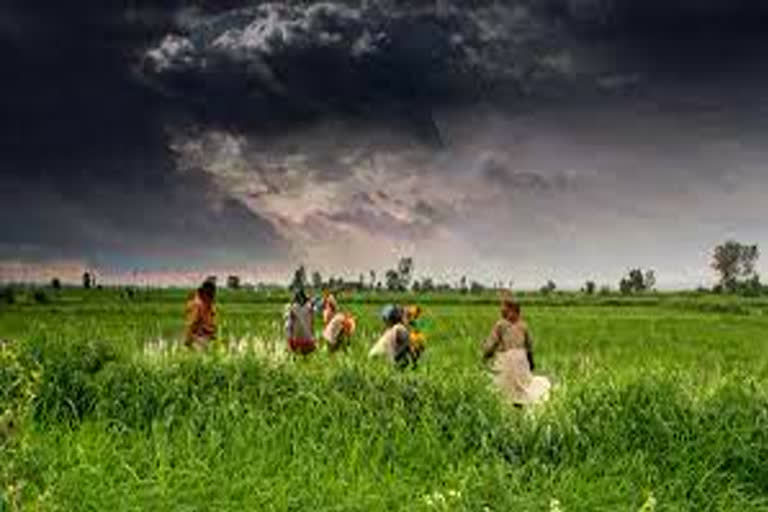Chennai: Addressing the long neglect of farmers, the first agriculture budget of the DMK government has the twin purpose of boosting food grain-cum-cereal production and ensuring sustainable income generation with an emphasis on transforming the cultivator into an entrepreneur in the long run.
The very name of the ministry has been rechristened into the Department of Agriculture and Farmers' Welfare to signal the change in the approach of the state government under Chief Minister MK Stalin. A separate budget for agriculture was a pledge made by the DMK in its election manifesto. Tamil Nadu is the third state to have an exclusive budget for agriculture, after Karnataka and Andhra Pradesh.
Among the many proposals, the schemes to establish Agri Incubation Centres (AIC) to attract investors and entrepreneurs and training youth to equip them to become agri-entrepreneurs are very significant.
Presenting the budget, Agriculture Minister MRK Panneerselvam said the AICs would be set up wherever necessary. In order to empower the youth as entrepreneurs in the farm sector, the government would provide training initially to 2,500 candidates in the first phase. Further, in order to encourage graduates in agriculture to engage in cultivation, skill development training would be offered to them.
To give a fillip to Agri exports, it has been proposed to establish an Export Facilitation Centre at a cost of Rs One crore in Chennai, exclusively to cater to the needs of farmers. Besides providing information on securing markets for their produce, it would assist them in export-related matters. First-time exporters would be given a 50 per cent fee concession in availing of the APEDA quality assurance certificate. A moringa export zone, comprising Theni, Dindigul, Madurai, Karur, Thoothukudi, Ariyalur and Tirupur, is being created.
Also read: TN Budget 2021-22: Chennai gets new metro routes, plans for Madurai metro on roll
Since moringa is considered an aphrodisiac with demand in markets abroad, a value addition centre with driers, pulverisers and automatic packaging machines would be set up to export moringa products, including moringa honey.
With regard to mechanisation, in the current year, 100 Farmer Cultivator Associations would be formed with a membership of 1,10,000 and each association would be extended a loan of Rs five lakh to purchase farm machinery.
Under the 'Kalaignar All Village Integrated Agriculture Development programme' (named after DMK founder and former Chief Minister M Karunanidhi), to be implemented in five years, efforts would be made to enhance the income of cultivators in 12,000 village panchayats. Initially, this would be carried out in 2,500 villages by increasing the cultivable area by creating irrigation facilities with an outlay of Rs 250 Crore. Combining the allocation from the Union Government, the total outlay would be Rs 1,245.45 Crore.
The government would hike the extent of cultivable lands from the present 60 per cent to 75 per cent, by turning fallow lands into arable ones. A total of 11.75 hectares of fallow lands would be converted into cultivable lands in the next 10 years and another 19.31 hectares of fallow has been identified.
With organic farming gaining popularity, the government has decided to create a Centre after the late Nammalvar, who propagated 'natural farming' all his life. Further, a separate department would be set up for Organic farming, Panneerselvam said.
As a step towards setting up cold storages across the state, two would come up at Panruti and Oddachatram. The stretch between Trichy and coastal Nagapattinam in the Cauvery delta has been declared as an Agro-Industrial Corridor. A museum of traditional cropping and agriculture would be established in Chennai.
Also read: Petrol Price: TN govt slashes tax by Rs 3
Of the total outlay of Rs 34,220.65 Cr for agriculture, Rs 4,508.23 Cr goes for free power supply to farmers with the government paying Rs 20,000 to each pump set. For crop insurance, it is Rs 2,327 Cr. The Minister had announced a marginal increase in the procurement price for cane and paddy.
However, the budget is silent on the welfare of agriculture labourers who are integral to farming. In the Cauvery delta alone there are 13 lakh labourers engaged in farming and related activities. Due to loss of employment during the pandemic, many in the urban centres have returned to their villages and they mostly would be turning to agriculture. Turning agriculture into entrepreneurship should take into account the labour force as well, say, economists.



